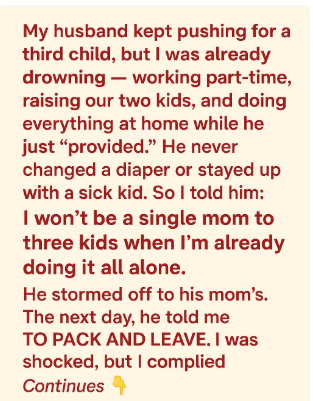It began like any other day: dishes piled in the sink, a half-finished breakfast on the table, and my five-year-old tugging at my shirt while I attempted to log in for a work meeting. Just the usual beautiful chaos of being a part-time remote worker and a full-time mom. Little did I know, this day would mark either the end of one chapter or the start of something better.
I’ve been married to Eric for twelve years. I’m 32, and he’s 43. We have two children: Lily, who’s ten and has a passion for drawing dragons, and Brandon, who’s five and believes peanut butter can solve any problem.
I love them deeply and have given them everything I have.
As for Eric? He provides financially.
That’s his favorite line — “I provide.”
But when it comes to anything else—diapers, meals, school forms, or comforting a crying child at midnight—he disappears. He’s never packed a lunch, never stayed up with a feverish kid, and thinks folding laundry is beneath him.
Still, I kept the household running—coffee-fueled mornings, endless chores, and quiet tears in the shower when no one was watching. I convinced myself this was normal marriage fatigue.
Then came the evening that cracked everything open.
It was during dinner. Brandon was flinging peas on the floor, Lily was complaining about her math test, and Eric, scrolling through his phone, suddenly said, “I think it’s time for us to have another baby.”
I nearly dropped my fork.
“What did you just say?”
“A third kid. We’ve got the space,” he replied casually, not even looking up from his phone.
I stared at him. “You don’t help with the two we already have, Eric. Why would I take on more?”
That’s when he launched into his old monologue: I work hard. I provide. You have it easy.
Easy. The word stung more than I expected.
Before I could respond, his mother Brianna and his sister Amber appeared in the doorway. They’d overheard everything, of course.
“A man doesn’t like to be criticized by his wife,” Brianna said, her tone dripping with false sweetness.
Amber chimed in, “You should be grateful, honestly. Some women would kill to have a husband who provides.”
Spoiled. That’s what they called me — for wanting a partner, not just a paycheck.
Eric stayed silent as the women in his life tag-teamed to put me in my place. In that moment, something inside me hardened. I saw my marriage clearly for what it was — a performance where I played the dutiful wife, applauding a man who never even showed up for his role.
That night, after everyone had gone to bed, he brought it up again — another baby, as if the earlier humiliation hadn’t happened. He didn’t ask how I felt. He expected me to comply.
I said no.
And that one word shattered his illusion of control.
“You’ve changed,” he snapped. “You don’t love me or the kids anymore.”
“No,” I said quietly. “I’ve grown up. There’s a difference.”
He glared at me, then said something I’ll never forget. “Pack your things and leave. I can’t live with this anymore.”
For a moment, I stood frozen. Then, slowly, I nodded.
Before I walked out, I turned to him. “Fine. I’ll go. But the kids stay here with you. You said it was easy—prove it.”
His face drained of color. “That’s not happening.”
“Oh, it is,” I said calmly. “You don’t get to choose now.”
Then I walked out with nothing but a bag over my shoulder—and my sister waiting in the car.
The next day, he called. His voice was shaky. “I can’t do this. They won’t stop crying. I don’t even know what to make them for breakfast.”
No surprise there.
Within weeks, I filed for divorce. I got the house, full custody, and child support. It wasn’t revenge—it was balance finally restored.
I never wanted it to come to this. But sometimes, you have to let the old structure collapse so something stronger can rise in its place.
I don’t feel guilty anymore. I feel free. For the first time in years, I’m not waiting for someone to show up for me.
I’ve shown up for myself.




